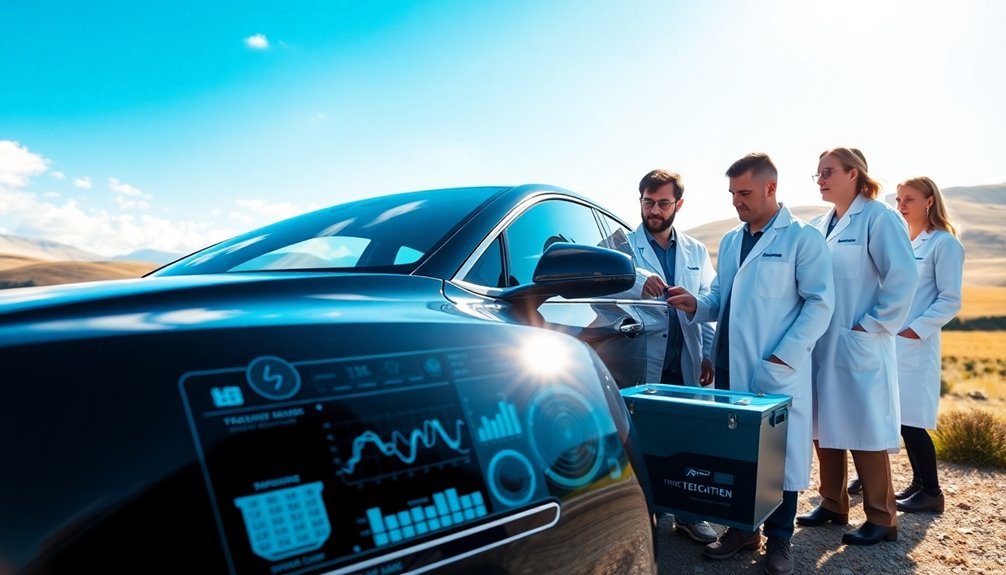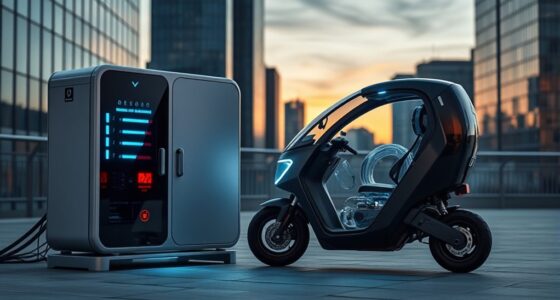Electric car batteries usually last between 8 to 15 years, with many hitting around 200,000 miles. You can expect about 70-80% capacity after a decade, thanks to improvements in battery technology. Factors like temperature and charging habits impact battery longevity; keeping your battery between 68 to 86 degrees Fahrenheit is ideal. To extend its life, charge to 80% for daily use and avoid rapid charging frequently. Manufacturers offer warranties up to 10 years, showcasing their confidence in battery durability. There's a lot more you can learn about maximizing battery life and the latest innovations in the field.
Key Takeaways
- Electric car batteries typically last between 10 to 20 years, with an average expectancy of 8 to 15 years.
- The average lifespan of EV batteries is around 200,000 miles, significantly exceeding the 133,000 miles of internal combustion engine vehicles.
- Manufacturers usually provide warranties for EV batteries up to 8 years or 100,000 miles, with some extending to 10 years.
- Battery degradation occurs at a rate of 2-3% per year, retaining 70-80% of capacity after a decade of use.
- Proper charging habits and temperature management can significantly enhance the longevity of electric car batteries.
Lifespan of Electric Car Batteries

When you consider purchasing an electric car, understanding the lifespan of its battery is vital.
Typically, EV batteries last between 10 to 20 years, with an average expectancy of 8 to 15 years under normal use. Many manufacturers provide a battery warranty extending up to 8 years or 100,000 miles, some even offering up to 10 years.
Keep in mind that battery degradation happens at a rate of about 2-3% per year, allowing certain models to retain 70-80% of their original capacity after a decade.
Your charging habits and maintaining ideal operating conditions, ideally between 68 to 86 degrees Fahrenheit, can greatly affect battery lifespan.
Proper care is essential, especially considering replacement costs can soar up to $20,000.
Factors Affecting Battery Longevity
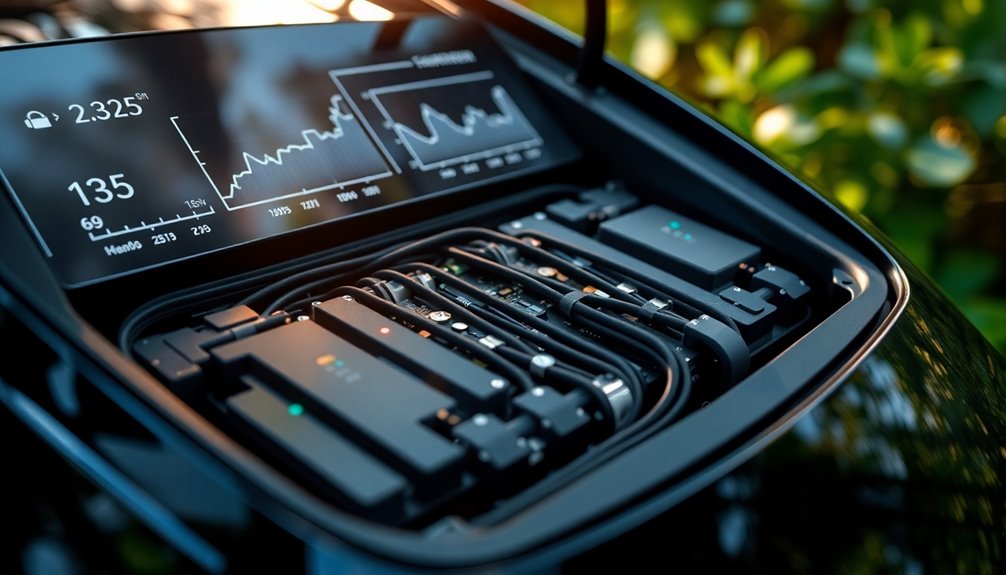
Several factors can greatly influence the longevity of your electric car's battery.
Battery degradation typically happens at a rate of 2-3% per year, but this can vary notably based on temperature and charging habits. If you live in a warmer climate, operating temperatures above the ideal range of 68 to 86 degrees Fahrenheit can accelerate degradation, reducing battery longevity.
Additionally, your charging practices play an essential role—frequent use of fast charging or letting the battery fully discharge can harm its health.
To maximize the lifespan of your EV batteries, aim to maintain a balanced state of charge between 20% and 80%.
Charging Practices for Longevity
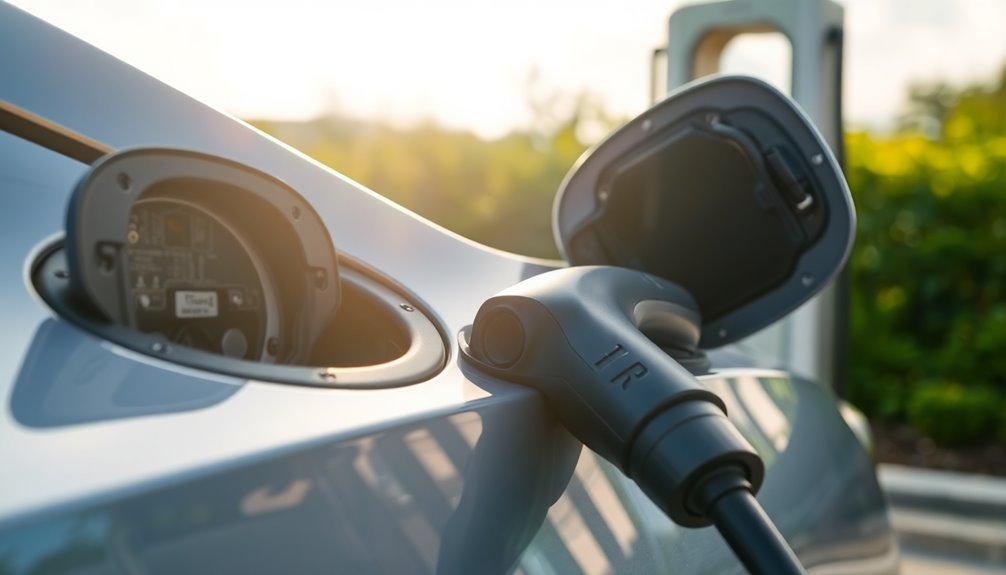
To guarantee your electric car battery lasts as long as possible, adopting smart charging practices is key. Aim for charging to 80% for everyday use; this balanced approach helps enhance your battery lifespan. Reserve charging to 100% for long trips only.
Regularly using Level 2 charging instead of DC fast charging is crucial, as it minimizes stress on your EV battery packs and reduces battery degradation. Try to avoid complete discharges and minimize rapid charging frequency, as these can lead to faster degradation, averaging around 2.3% per year.
Also, keep your battery temperature between 68 and 86 degrees Fahrenheit. Utilizing advanced battery management systems (BMS) further guarantees you're following effective charging practices, preserving your battery's performance over time.
Environmental Impact of EV Batteries

Charging practices play a significant role in maintaining your electric vehicle's battery, but they also tie into broader environmental reflections.
The production and disposal of EV batteries have a notable environmental impact, making sustainable sourcing essential. Here are some key points to contemplate:
- Carbon Footprint: Battery production generates significant emissions.
- Recycling Programs: These initiatives are crucial to minimize waste and promote a circular economy.
- Second-Life Applications: Used batteries can support renewable energy systems, extending their lifecycle.
- Sustainable Sourcing: Prioritizing materials like lithium and cobalt reduces ecological harm.
Innovations in Battery Technology

You're likely excited about the latest advancements in battery technology, especially with solid-state batteries on the horizon, promising better safety and longevity.
Fast charging innovations are also making it easier to power up your electric vehicle in record time.
Plus, ongoing research into sustainable materials is paving the way for a greener future in battery production.
Solid-State Battery Advances
As researchers push the boundaries of battery technology, solid-state batteries are emerging as a promising solution for electric vehicles. These batteries utilize a solid electrolyte, offering numerous advantages over traditional lithium-ion batteries:
- Higher energy density – Potentially over 500 Wh/kg, doubling the current capabilities.
- Longer lifespans – Expected to last up to 20 years, compared to 8-15 for lithium-ion.
- Faster charging times – Some prototypes can reach 80% charge in under 15 minutes.
- Improved safety – Reduced flammability risks enhance overall safety.
With major automakers investing heavily, it's exciting to think that solid-state technology could commercialize within the next decade, revolutionizing how we power our electric vehicles.
Fast Charging Innovations
While the convenience of fast charging can revolutionize the electric vehicle experience, it is essential to understand its implications for battery health. Fast charging technologies, like 800-volt systems, can recharge your battery from 10% to 80% in about 21 minutes. However, this rapid charging can lead to faster battery degradation in lithium-ion batteries. Battery management systems (BMS) are evolving to mitigate these effects, optimizing energy use during quick charges. Additionally, research into solid-state batteries aims to provide safer, more efficient alternatives without the same degradation risks. As charging infrastructure expands, balancing speed and battery longevity remains important for sustainable electric vehicle use.
| Technology Type | Advantages | Challenges |
|---|---|---|
| Fast Charging | Quick recharge times | Increased battery degradation |
| Battery Management | Optimizes charging processes | Requires advanced tech |
| Solid-State Batteries | Enhanced safety & efficiency | Still in research phase |
Sustainable Material Sourcing
Fast charging innovations have transformed electric vehicle use, but the sustainability of battery materials is equally important for the future of the industry.
Prioritizing sustainable sourcing for lithium-ion battery packs can greatly reduce the environmental impact. Here's why it matters:
- Ethical mining practices promote responsible sourcing.
- Alternative materials like sodium-ion can lessen reliance on cobalt.
- Recycling programs recover valuable components, minimizing waste.
- Second-life applications for used batteries can power renewable energy systems.
Incorporating sustainable practices in the sourcing and manufacturing of battery materials will not only reduce the carbon footprint but also enhance the overall efficiency of energy systems.
Collaborative efforts between automakers and technology firms are essential for developing sustainable battery solutions.
By focusing on these strategies, you can help guarantee a greener future and encourage responsible consumption in the electric vehicle industry.
Together, we can drive change for a more sustainable planet.
Maintenance Tips for EV Batteries
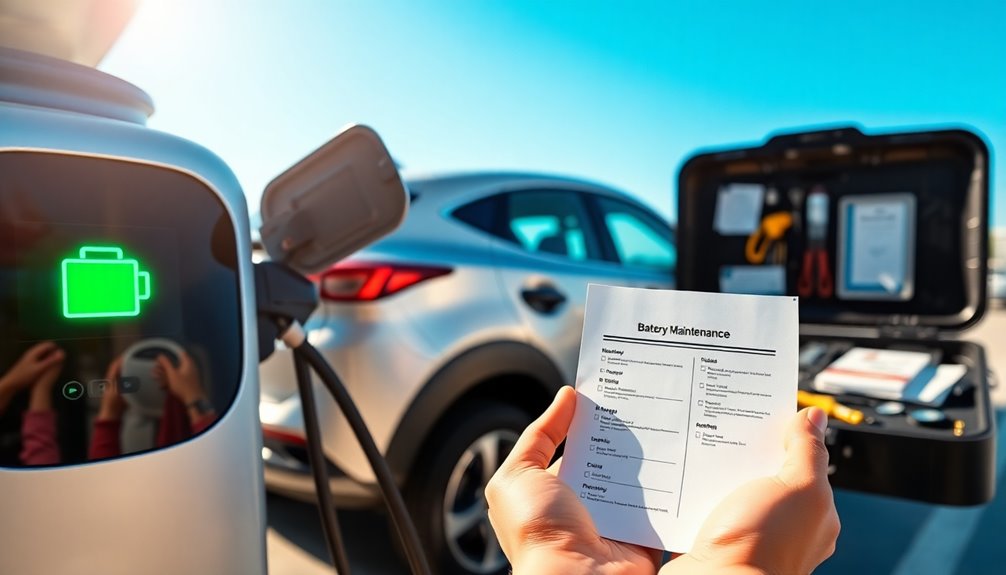
To keep your EV battery healthy, focus on ideal charging practices and temperature management.
Charge between 20% and 80%, and avoid frequent fast charging to extend its lifespan.
Regularly monitor your battery's condition and temperature to guarantee it stays within the perfect range.
Optimal Charging Practices
Understanding ideal charging practices is essential for maximizing the lifespan of your electric vehicle (EV) battery.
By following these optimal charging practices, you can considerably enhance your battery health:
- Charge to 80% instead of 100% for daily use to minimize degradation.
- Use Level 2 charging for regular charging, as it balances speed and battery health.
- Avoid complete discharges; keeping your battery above 20% helps prevent capacity loss.
- Keep temperatures moderate; ideally between 68 to 86 degrees Fahrenheit to protect against extreme temperatures.
Temperature Management Strategies
While extreme temperatures can negatively impact your electric vehicle's battery life, implementing effective temperature management strategies can greatly enhance its longevity.
Use temperature management systems, like active thermal management, to maintain ideal battery temperatures between 68 to 86 degrees Fahrenheit. These systems often utilize liquid cooling to prevent overheating during operation and charging.
Adopt good charging practices by avoiding rapid charging and keeping your charge level between 20% and 80%, which helps minimize thermal stress on the battery. Additionally, park in shaded or temperature-controlled environments to preserve battery health during extreme weather.
Manufacturers often add insulation and thermal barriers to mitigate cold temperature effects, further supporting your battery's lifespan and performance.
Regular Battery Monitoring
Monitoring your electric vehicle's battery regularly is essential for maintaining its health and performance. Here are some key practices to follow:
- Keep the battery capacity between 20% and 80% to enhance longevity and performance.
- Update your vehicle's software to benefit from the latest optimizations in battery management systems.
- Consider environmental factors; keep your EV battery between 68 to 86 degrees Fahrenheit to prevent degradation.
- Use Level 2 charging methods instead of fast charging whenever possible to reduce stress on the battery.
Comparing EV and ICE Battery Life
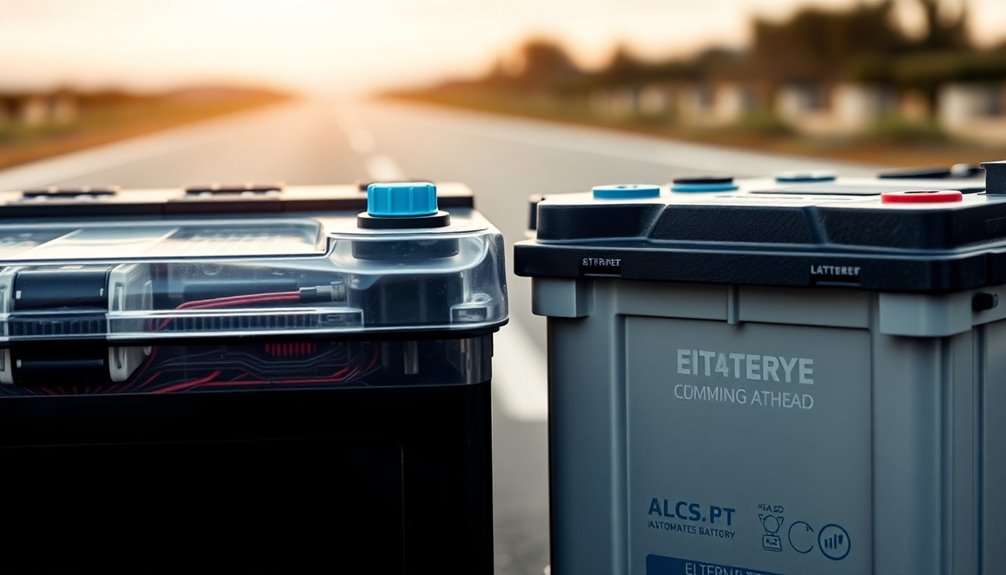
When comparing the battery life of electric vehicles (EVs) to that of internal combustion engine (ICE) vehicles, it's clear that EVs offer significant advantages. EV batteries typically last around 200,000 miles, far exceeding the ICE lifespan of about 133,000 miles. Additionally, EV batteries have an average degradation rate of just 2.3% per year, maintaining 70-80% capacity after a decade. Tesla's pursuit of a million-mile battery highlights advancements in battery technology, pushing the boundaries of longevity. This often results in longer vehicle durability for EVs compared to ICE vehicles.
| Aspect | EVs | ICE Vehicles |
|---|---|---|
| Average Lifespan | 200,000 miles | 133,000 miles |
| Warranty | 8 years / 100,000 miles | 5 years / 60,000 miles |
| Degradation Rate | 2.3% per year | N/A |
Frequently Asked Questions
What Is the Life Expectancy of Electric Car Batteries?
Electric car batteries generally have a life expectancy of about 10 to 20 years, depending on your usage.
You'll typically see them last around 8 to 15 years under normal conditions. Most manufacturers provide warranties for 8 years or 100,000 miles, ensuring some peace of mind.
Factors like temperature and charging habits can affect battery longevity, so taking good care of your EV can help maximize its lifespan and performance.
How Much Does It Cost to Replace a Battery in an Electric Car?
When you're considering replacing an electric car battery, costs can vary considerably.
You might find prices ranging from $5,000 to over $20,000, depending on your vehicle's make and model.
Fortunately, the average replacement cost for lithium-ion batteries is expected to drop as technology advances.
Many manufacturers also provide warranties for at least 8 years or 100,000 miles, giving you some peace of mind about battery longevity and reliability.
What Happens to an Electric Car Battery After 10 Years?
After 10 years, you'll likely find your electric car battery retains about 70-80% of its original capacity.
This means you might notice a gradual reduction in driving range, as batteries generally degrade by 2-3% each year.
Environmental factors and how you use the car play a significant role in this.
If you live in a moderate climate, you could enjoy a longer lifespan, with some batteries lasting even up to 15 years.
Can an EV Battery Last 20 Years?
Imagine a tree growing strong over decades, its roots deepening with care.
Can an EV battery last 20 years? Absolutely, if you nurture it right.
Factors like temperature and charging habits play crucial roles, much like sunlight and water for that tree.
With advancements in technology, many batteries mightn't just survive but thrive well beyond 20 years.
Conclusion
In the ever-evolving world of electric vehicles, you might find yourself cruising down a sun-drenched road, the hum of your electric car soothing your senses. With proper care, those batteries can last well over a decade, much like a trusty companion on your journeys. By adopting smart charging habits and staying informed about innovations, you can guarantee your ride remains as vibrant as the day you bought it—ready to take you wherever the road leads.

